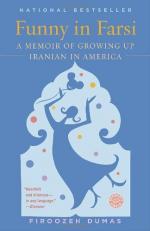|
This section contains 670 words (approx. 2 pages at 400 words per page) |

|
Funny in Farsi: A Memoir of Growing Up Iranian in America Summary & Study Guide Description
Funny in Farsi: A Memoir of Growing Up Iranian in America Summary & Study Guide includes comprehensive information and analysis to help you understand the book. This study guide contains the following sections:
This detailed literature summary also contains Topics for Discussion and a Free Quiz on Funny in Farsi: A Memoir of Growing Up Iranian in America by Firoozeh Dumas.
"Funny in Farsi - A Memoir of Growing Up Iranian in America," tells the story of Firoozeh, her parents Kazem and Nazireh, her brothers and an extended family most of whom eventually transplanted from their homeland of Iran to America. At just seven years of age, Firoozeh and her family moved from Abadan, Iran, to Whittier, California, which is a suburb of Los Angeles. Kazem, who was an engineer with the National Iranian Oil Company, had lived in American when he won a Fulbright grant to attend graduate school first in Texas and then later in California. He had nothing but positive memories about his time as a student and was confident of his English.
Nazireh and Firoozeh were relieved that Kazem knew English because they only spoke Persian. But they soon learned from shopping and dining out that no one in American could begin to understand a thing Kazem was saying when he spoke English. Firoozeh caught on to English quickly at school. She soon became her mother's interpreter during shopping excursions. Nazireh learned her English from quiz shows. When she spoke English, it was without verbs and with a generous use of the word "it." She called everything from her husband to her kitchen table "it."
Firoozeh takes the reader through the journey of her family in an unknown land and strange new culture. Kazem loved Disneyland in an almost worshipful way. Walt Disney was a genius. The patient park visitors waiting in long lines impressed him—in Iran such a wait would result in physical combat. Although the family didn't find American food very tasty, they marveled at the smiling waitresses, the clean bathrooms and the clear signage on the way to the restaurants—things that were not common in Iran.
Although the family adored America and felt fortunate to be there, they never stopped loving their homeland and all the friends and family there. Firoozeh and her family where treated with kindness by everyone they met in American. Most Americans had not heard of Iran at the time she first entered the country. Americans were impressed with her intelligence, surprised that such a tiny girl could speak Persian! They had many questions for her but their curiosity was always accompanied by good manners and kindness.
Firoozeh's family settled into American life never abandoning their allegiance to Iran. In general, things went well but there were times when Firoozeh felt isolated and left out. Firoozeh describes her time at summer camp when she did not make one friend and wouldn't take a shower because of her culture's attention to modesty. Christmas time was a difficult time for non-Christian immigrants to be in the US because the holiday was such a huge presence during all of December. Her family's favorite Christmas past time was watching the Bob Hope specials.
After the Iranian Revolution began, Americans became less friendly and more suspicious of resident Iranians—particularly during the Iranian hostage crisis. Kazem lost his job with the Iranian oil company since the country had ceased building new refineries. He had problems attaining a new position because of bias against his ethnicity. After the hostages were released, an American company hired him; however, at a much lower salary than he had in the past. But it didn't bother him. He knew it wasn't money that made a man rich.
Firoozeh met a Frenchman, Francois Dumas, while they were both students at Berkeley. The couple eventually married. Francois' family was against their union but the were undeterred. They were married in both a Catholic mass and a traditional Persian ceremony. Firoozeh's chronicle of her and her family's life in and adjustment to America is light-hearted and fun. Even in the face of prejudice and unfortunate times, the family drew on the support of one another and made it through. They loved America and appreciated the opportunities they were given but they never lost sight of their homeland. Iran would forever be in their hearts.
Read more from the Study Guide
|
This section contains 670 words (approx. 2 pages at 400 words per page) |

|



